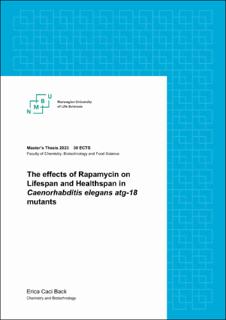| dc.description.abstract | Aging is a biological process causing loss of physical integrity, reduced function, and higher vulnerability to death. Aging also increases the risk of major human diseases including cancer, diabetes, cardiovascular disorders, and neurodegenerative disorders like dementia. Research on aging and age-related diseases is important to improve human health during aging to minimize the global socioeconomic burden and challenges in healthcare. Autophagy is a cellular clearance pathway which promotes homeostasis in the cells and is proposed as a hallmark of aging. A disruption of autophagy is shown to accelerate age-related aggregation of proteins and shorten lifespan in several model organisms. An increase in autophagy e.g., by the autophagy-inducer rapamycin has shown suppressed protein aggregation as well as promoted health and longevity. Studies have shown that induction of autophagy by treatment with rapamycin in the widely used nematode Caenorhabditis elegans extends lifespan and healthspan parameters.
This study aimed to investigate the effects of rapamycin treatment with a malfunctioning autophagy-machinery to see whether the treatment can affect lifespan and/or healthspan without affecting autophagy. C. elegans atg-18(gk378) with a loss-of-function mutation causing a malfunctional autophagy-machinery were investigated. Lifespan assay, as well as the healthspan assays pharyngeal pumping and thrashing were performed in the mutant and in a WT strain to examine the effects of the treatment. The lifespan assay showed a decreased lifespan for the mutants treated with rapamycin, suggesting that rapamycin might affect other mechanisms related to the process of aging with a negative effect. Considering that the thrashing assay might be a more reliable healthspan parameter than the pumping assay, rapamycin-treatment seemed to increase healthspan of the mutants as well as for the WT.
To validate the effect of rapamycin on autophagy and the mammalian ATG-18 homolog WIPI2, HeLa cells with GFP-tagged WIPI2B were treated with rapamycin. Imaging of the cells clearly showed an increase in autophagy after 24 hours of treatment. Imaging as well as Western Blots suggested that 2 hours of treatment is not sufficient to show an effect of rapamycin-treatment.
This study suggests that rapamycin decreases the lifespan of C. elegans atg-18(gk378) mutants, but to some degree promote healthier aging. The mechanisms seemingly affected by rapamycin in the C. elegans mutants may be interesting for further investigation. Not only in C. elegans, but also using other model organisms to investigate the replicability of the results in other models. | |
